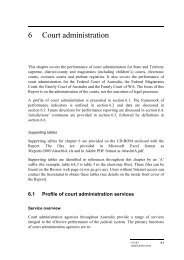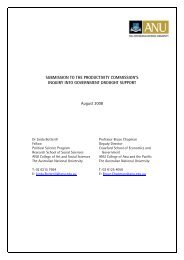7 Occupancy costs (PDF - 106 Kb) - Productivity Commission
7 Occupancy costs (PDF - 106 Kb) - Productivity Commission
7 Occupancy costs (PDF - 106 Kb) - Productivity Commission
You also want an ePaper? Increase the reach of your titles
YUMPU automatically turns print PDFs into web optimized ePapers that Google loves.
outgoing <strong>costs</strong>. However, the opposite is in fact correct. … From an owner’s<br />
perspective, the returns required to justify their outgoing investment in a centre is<br />
dependent upon ensuring that rents, preferably, increase over time. Consequently, it is<br />
in the owners’ best interests to also ensure that outgoings are minimised (as they are<br />
purely a recovery of actual <strong>costs</strong>), so that as much of a tenant’s total occupancy cost is<br />
derived from rent, resulting in real returns to owners. (submission no. 78, p. 5)<br />
In general, while most tenants did not dispute that outgoings were a legitimate cost<br />
of tenancy within shopping centres, many felt that landlords were not accountable<br />
for their spending decisions made with these monies.<br />
Fit-out requirements<br />
In most shopping centres, tenancy leases require that fit-out, maintenance or repairs<br />
on shops be undertaken by designated contractors. A number of retailers expressed<br />
concern about the prices charged by designated contractors for these services and<br />
the lack of transparency in relation to the determination of such <strong>costs</strong>. ANRA, for<br />
example, said:<br />
… during refurbishments landlords can use their preferred contractors to erect<br />
hoardings, despite the fact these contractors charge between three and four times the<br />
going commercial rate for such services.<br />
Current invoicing processes do not detail all expensed items, which makes any attempts<br />
at auditing by tenants both costly and time consuming. ANRA would like to see greater<br />
clarity in how expenses and charges are categorised, with a consistent national<br />
approach. (submission no. 92, p. 8)<br />
An argument put forward by shopping centre landlords is that designated<br />
contractors are required to meet safety and other centre standards. As one centre<br />
owner/manager advised the <strong>Commission</strong>:<br />
It is common for landlords of shopping centres to require tenants to use the landlord’s<br />
contractors to deal with service alterations. This practice is designed to ensure that the<br />
services of the centre are not damaged by an inexperienced contractor. (confidential<br />
submission)<br />
Another centre owner/manager pointed out that retail tenancy legislation in New<br />
South Wales and Victoria requires landlords to disclose to tenants the cost of<br />
alterations to the services prior to signing the lease or alternatively to disclose a<br />
formula which sets out how the <strong>costs</strong> are to be calculated:<br />
… this requirement achieves that balance between a landlord being able to maintain the<br />
integrity of the essential services at the Centre and tenants knowing in advance the<br />
likely <strong>costs</strong> of alterations to services for which they will be responsible. (confidential<br />
submission)<br />
134 THE MARKET FOR<br />
RETAIL TENANCY<br />
LEASES IN

















